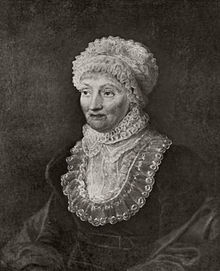Caroline Herschel
| Caroline Herschel | |
|---|---|
 |
|
| Born | Caroline Lucretia Herschel 16 March 1750 Hanover, Electorate of Hanover, HRE |
| Died | 9 January 1848 (aged 97) Hanover, Kingdom of Hanover, German Confederation |
| Nationality | German |
| Fields | Astronomy |
| Known for | Discovery of several comets |
| Notable awards |
Gold Medal of the Royal Astronomical Society (1828) Prussian Gold Medal for Science (1846) |
Caroline Lucretia Herschel (16 March 1750 – 9 January 1848) was a German astronomer, whose most significant contributions to astronomy were the discoveries of several comets, including the periodic comet 35P/Herschel-Rigollet, which bears her name. She was the sister of astronomer William Herschel, with whom she worked throughout her career.
She was the first woman to be awarded a Gold Medal of the Royal Astronomical Society (1828), and to be named an Honorary Member of the Royal Astronomical Society (1835, with Mary Somerville). She was also named an honorary member of the Royal Irish Academy (1838). The King of Prussia presented her with a Gold Medal for Science on the occasion of her 96th birthday (1846).
Caroline Lucretia Herschel was born in the town of Hanover on 16 March 1750. She was the eighth child and fourth daughter of Isaac Herschel, an oboist, and his wife, Anna Ilse Moritzen. Isaac became a bandmaster in the Guards and was away with his regiment for substantial periods. He became ill after the Battle of Dettingen in 1743 and never recovered fully, suffering from a weak constitution, chronic pain, and asthma for the remainder of his life. The oldest of their daughters, Sophia, was the only surviving girl besides Caroline. She married when Caroline was five, meaning that the younger girl was tasked with much of the household drudgery. Caroline and the other children received a cursory education, learning to read and write and little more. Her father attempted to educate her at home, but his efforts were mostly successful with the boys.
At the age of ten, Caroline was struck with typhus, which stunted her growth, such that she never grew taller than four feet three inches. She suffered vision loss in her left eye as a result of her illness. Her family assumed that she would never marry and her mother felt it was best for her to train to be a house servant rather than becoming educated, opposing her father's wishes. Her father sometimes took advantage of her mother's absence to teach her directly or include her in her brother's lessons, such as violin. Caroline was briefly allowed to learn dress-making. Though she learned to do needlework from a neighbor, her efforts were stymied by long hours of household chores. To prevent her from becoming a governess and earning her independence that way, she was forbidden from learning French or more advanced needlework than what she could pick up from neighbours.
...
Wikipedia
